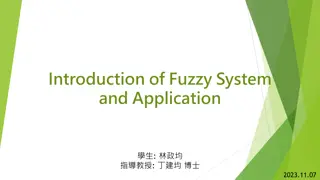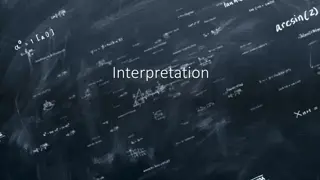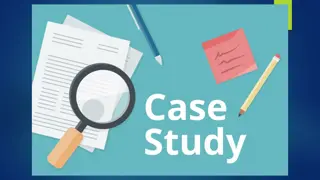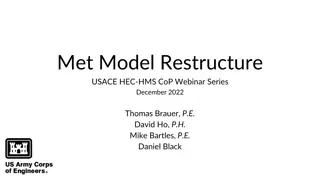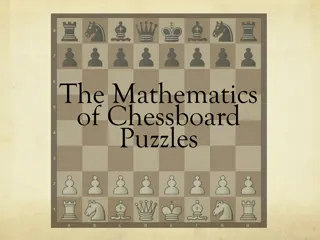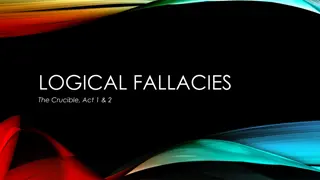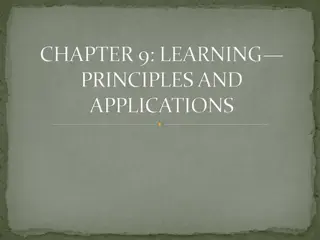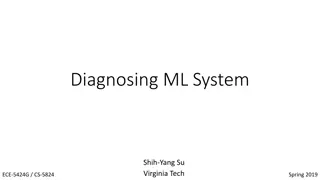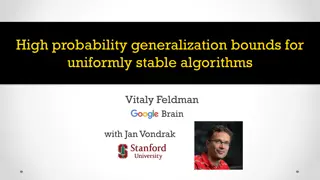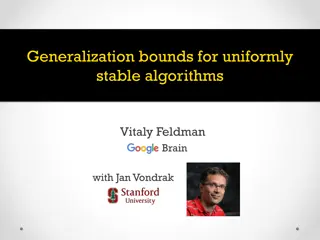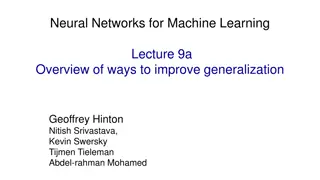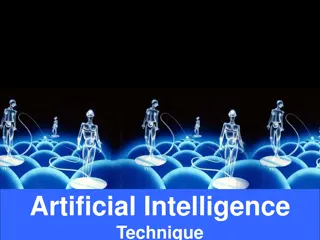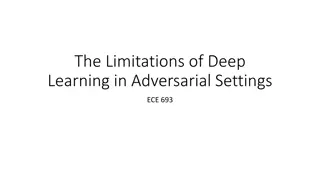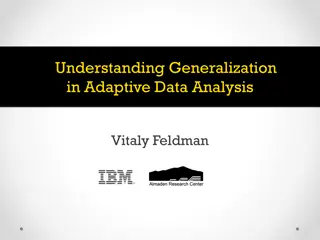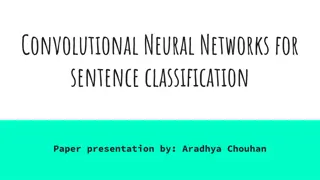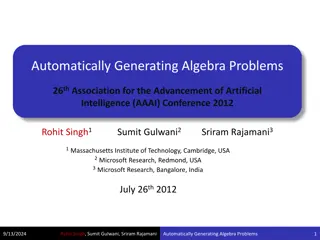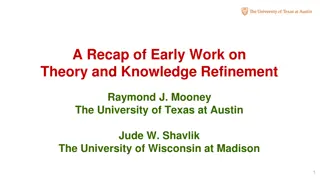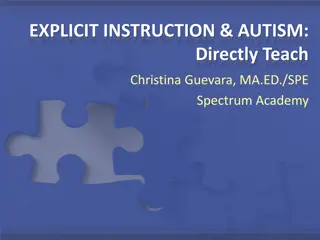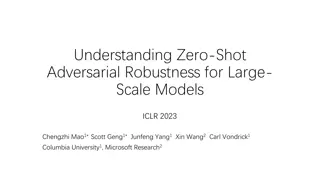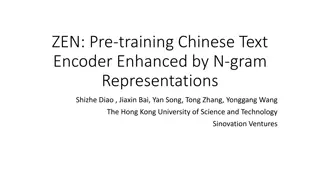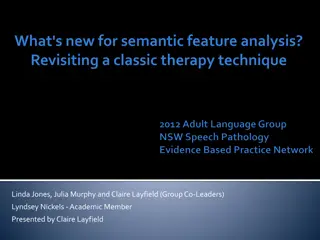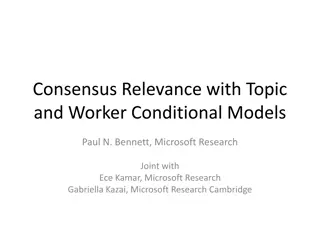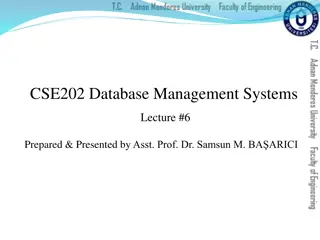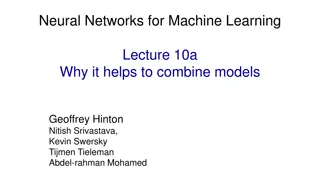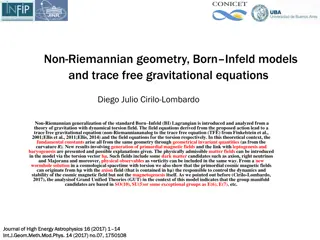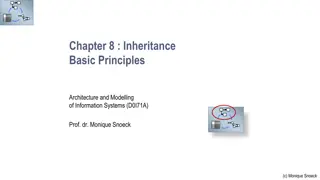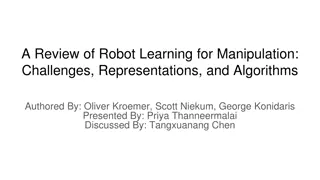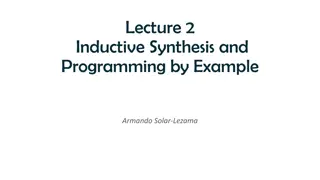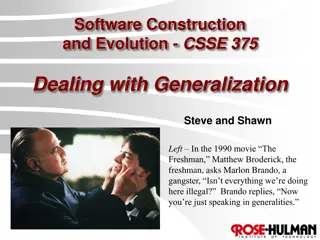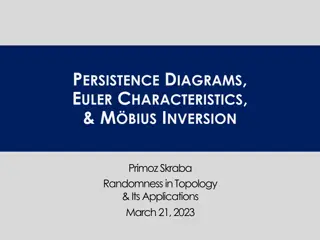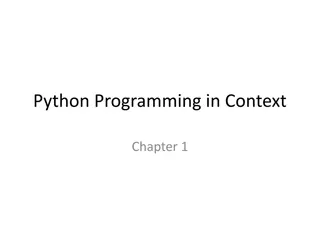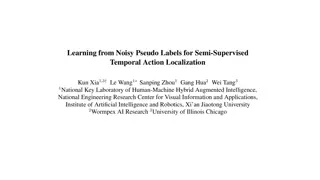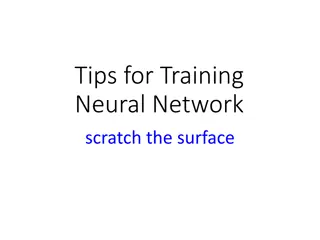Introduction of Fuzzy System and Application
Fuzzy logic, introduced by Professor Zadeh in 1965, offers a way to model linguistic fuzzy information, providing better generalization and error tolerance for nonlinear systems. Fuzzy sets remove sharp boundaries in classical sets, allowing for gradual transitions between membership and non-members
7 views • 23 slides
Generalization in Research Studies
Generalization in research refers to the extent to which findings can be applied on a larger scale. It is essential for the credibility and applicability of research results. The process of generalization involves statistical generalization and analytical generalization, each serving different purpo
3 views • 5 slides
Advantages and Disadvantages of Case Study Method in Research
The case study method offers in-depth insights into social units, revealing behavior patterns, motivations, and historical perspectives. It aids in constructing questionnaires, enhances researcher experience, and facilitates the study of social changes. However, limitations include lack of comparabi
1 views • 7 slides
Generalization: Facts, Opinions, and Validity
Exploring the concept of generalization, this content distinguishes between facts, opinions, and valid generalizations. It emphasizes how generalizations are broad statements based on information and experiences, while facts can be proven true and opinions are belief-based. Key words and examples ar
2 views • 8 slides
Audit Sampling Guidelines and Reference Materials for Internal Auditors
Review authoritative guidance for audit sampling and the potential for external auditor reliance on internal auditors. Understand and apply concepts related to audit sampling to project results with certainty. Available reference materials include AICPA Codification of Statements, AICPA Audit Guide,
9 views • 114 slides
Restructuring of USACE HEC-HMS Meteorologic Model
Significant modifications have been made to the HEC-HMS meteorologic model to enhance modeling tasks' ease and intuitiveness. The Met Model Restructure updates in versions 4.9 to 4.11 streamline meteorologic processes, introduce new features like automatic linkages and zonal editors for snowmelt, an
0 views • 19 slides
The Fascinating Mathematics Behind Knight's Tours and Chessboard Puzzles
Explore the intriguing world of Knight's tours and chessboard puzzles, from closed tours to open tours, with historical insights and mathematicians' quest for generalization beyond the standard 8x8 board. Delve into the challenges, solutions, and classifications that have captivated minds for centur
0 views • 19 slides
Examples of Classical and Operant Conditioning
Robert receiving a ticket for driving under the influence illustrates operant conditioning with negative punishments, while Chris being afraid of dogs after being bitten showcases classical conditioning with stimulus generalization. Jacob's joy from smelling his date's cologne demonstrates classical
1 views • 9 slides
Logical Fallacies in The Crucible: Act 1 & 2
The Crucible's Acts 1 and 2 are analyzed for logical fallacies including Hasty Generalization, Either/Or Fallacy, and False Cause among others. Key quotes and character interactions demonstrate flawed reasoning in the play's narrative.
4 views • 13 slides
Classical Conditioning Principles
Classical conditioning is a learning process where associations are formed between stimuli, resulting in behavioral changes. Pavlov's experiment with dogs illustrates this concept, involving neutral and unconditioned stimuli triggering responses. Learning occurs gradually during acquisition, with ge
0 views • 41 slides
Generalization of Empirical Risk Minimization in Stochastic Convex Optimization by Vitaly Feldman
This study delves into the generalization of Empirical Risk Minimization (ERM) in stochastic convex optimization, focusing on minimizing true objective functions while considering generalization errors. It explores the application of ERM in machine learning and statistics, particularly in supervised
2 views • 11 slides
Troubleshooting Machine Learning Systems: Tips and Strategies
Dive into the world of diagnosing and debugging machine learning systems with insights on fixing learning algorithms, understanding model failures, and strategies for improvement. Explore the importance of data collection, feature selection, hyperparameter tuning, and more to enhance your system's p
0 views • 43 slides
Stability and Generalization in Machine Learning
Exploring high probability generalization bounds for uniformly stable algorithms, the relationship between dataset, loss function, and estimation error, and the implications of low sensitivity on generalization. Known bounds and new theoretical perspectives are discussed, along with approaches like
1 views • 8 slides
Generalization Bounds and Algorithms in Machine Learning
Generalization bounds play a crucial role in assessing the performance of machine learning algorithms. Uniform stability, convex optimization, and error analysis are key concepts in understanding the generalization capabilities of algorithms. Stability in optimization, gradient descent techniques, a
0 views • 16 slides
Strategies for Improving Generalization in Neural Networks
Overfitting in neural networks occurs due to the model fitting both real patterns and sampling errors in the training data. The article discusses ways to prevent overfitting, such as using different models, adjusting model capacity, and controlling neural network capacity through various methods lik
1 views • 39 slides
Artificial Intelligence Techniques
Artificial Intelligence (AI) techniques leverage knowledge representation to achieve generalization, ease of adaptation, and problem-solving capabilities. Knowledge, although voluminous and dynamic, is crucial for developing effective AI solutions. By capturing important properties and enabling adju
0 views • 25 slides
Limitations of Deep Learning in Adversarial Settings
Deep learning, particularly deep neural networks (DNNs), has revolutionized machine learning with its high accuracy rates. However, in adversarial settings, adversaries can manipulate DNNs by crafting adversarial samples to force misclassification. Such attacks pose risks in various applications, in
0 views • 38 slides
Exploring Translation Techniques and Levels
Delve into various translation techniques such as amplification, false friends, explicitation, and generalization, as exemplified by Vinay and Darbelnet. Discover the concept of loss, gain, and compensation in translation, along with the different levels of translation, including lexicon, syntactic
0 views • 16 slides
Generalization in Adaptive Data Analysis by Vitaly Feldman
Adaptive data analysis involves techniques such as statistical inference, model complexity, stability, and generalization guarantees. It focuses on sequentially analyzing data with steps like exploratory analysis, feature selection, and model tuning. The approach emphasizes on avoiding hypothesis te
0 views • 25 slides
Convolutional Neural Networks for Sentence Classification: A Deep Learning Approach
Deep learning models, originally designed for computer vision, have shown remarkable success in various Natural Language Processing (NLP) tasks. This paper presents a simple Convolutional Neural Network (CNN) architecture for sentence classification, utilizing word vectors from an unsupervised neura
0 views • 15 slides
Automatically Generating Algebra Problems: A Computer-Assisted Approach
Computer-assisted refinement in problem generation involves creating algebraic problems similar to a given proof problem by beginning with natural generalizations and user-driven fine-tuning. This process is useful for high school teachers to provide varied practice examples, assignments, and examin
0 views • 16 slides
Evolution of Theory and Knowledge Refinement in Machine Learning
Early work in the 1990s focused on combining machine learning and knowledge engineering to refine theories and enhance learning from limited data. Techniques included using human-engineered knowledge in rule bases, symbolic theory refinement, and probabilistic methods. Various rule refinement method
0 views • 12 slides
Explicit Instruction & Autism by Christina Guevara, MA ED./SPE Spectrum Academy
Step by Step Explicit Instruction Theory into Practice with behavior-based methods like the Incredible 5-Point Scale. This systematic method focuses on modeling, prompted practice, and unprompted practice to teach skills effectively. Different behavior-based techniques such as Task Analysis, Chainin
0 views • 12 slides
Computational Learning Theory: An Overview
Computational Learning Theory explores inductive learning algorithms that generate hypotheses from training sets, emphasizing the uncertainty of generalization. The theory introduces probabilities to measure correctness and certainty, addressing challenges in learning hidden concepts. Through exampl
0 views • 43 slides
Understanding Zero-Shot Adversarial Robustness for Large-Scale Models
Pretrained large-scale vision-language models like CLIP show strong generalization on unseen tasks but are vulnerable to imperceptible adversarial perturbations. This work delves into adapting these models for zero-shot transferability in adversarial robustness, even without specific training on unk
0 views • 18 slides
ZEN: Pre-training Chinese Text Encoder Enhanced by N-gram Representations
The ZEN model improves pre-training procedures by incorporating n-gram representations, addressing limitations of existing methods like BERT and ERNIE. By leveraging n-grams, ZEN enhances encoder training and generalization capabilities, demonstrating effectiveness across various NLP tasks and datas
0 views • 17 slides
Revisiting Semantic Feature Analysis: A Classic Therapy Technique
Aphasia often involves semantic breakdown, and Semantic Feature Analysis (SFA) is a foundational technique for various treatments addressing semantic impairments. This presentation explores the effectiveness of SFA in improving naming, generalization to spontaneous speech, and treatment goals beyond
0 views • 16 slides
Consensus Relevance with Topic and Worker Models
Study focuses on recovering actual relevance of a topic-document pair using noisy predictions from multiple labelers. Various supervised, semi-supervised, and unsupervised approaches are explored. The goal is to obtain a more reliable signal from the crowd or benefit from scale through expert qualit
0 views • 15 slides
Object-Oriented Database Concepts and Limitations in Relational Models
Object-oriented database concepts are introduced as an alternative to relational models, addressing limitations such as lack of support for complex data structures, generalization, specialization, and aggregation. The shift towards a more data-centric approach in information systems development is d
1 views • 82 slides
Combining Neural Networks for Reduced Overfitting
Combining multiple models in neural networks helps reduce overfitting by balancing the bias-variance trade-off. Averaging predictions from diverse models can improve overall performance, especially when individual models make different predictions. By combining models with varying capacities, we can
0 views • 41 slides
Non-Riemannian Geometry and Born-Infeld Models in Gravitational Theory
In this paper by Diego Julio Cirilo-Lombardo, a non-Riemannian generalization of the Born-Infeld Lagrangian is introduced in the context of gravitation with a dynamical torsion field. The resulting field equations lead to a trace-free gravitational equation and provide insights into primordial magne
0 views • 34 slides
Basic Principles of Inheritance in Information Systems
Understanding inheritance in information systems is crucial for designing efficient architectures. This chapter delves into the principles of inheritance, such as attribute and method inheritance, generalization, and subtype hierarchies. It also discusses the modeling of inheritance through UML nota
0 views • 71 slides
Robot Learning for Manipulation: Challenges and Opportunities
A review of robot learning for manipulation presents key motivations, concepts, and formalization of learning tasks. It covers various aspects such as manipulations as physical systems, task decompositions, object-centric generalization, and learning object and environment representations.
0 views • 19 slides
Programming by Example: A Journey into Inductive Synthesis
Delve into the realm of Programming by Example (PBE) and its motivating factors, distinctions from Programming by Demonstration (PBD), history of inductive learning, and the significance of generalization from observations. Explore how PBE and PBD fit into the landscape of inductive learning and mac
0 views • 32 slides
Dealing with Generalization in Software Construction
Explore methods to address common code smells related to generalization in software development, such as dealing with duplicate code, inappropriate intimacy, and large classes. Learn how to apply techniques like Pull Up Field, Pull Up Method, and Extract Subclass to improve your code structure and m
0 views • 20 slides
Randomness in Topology: Persistence Diagrams, Euler Characteristics, and Möbius Inversion
Exploring the concept of randomness in topology, this work delves into the fascinating realms of persistence diagrams, Euler characteristics, and Möbius inversion. Jointly presented with Amit Patel, the study uncovers the vast generalization of Möbius inversion as a principle of inclusion-exclusio
0 views • 57 slides
Introduction to Python Programming in Context
This content introduces Python programming in context, focusing on Chapter 1. It covers real-world examples of computer science, problem-solving strategies, Python's numeric data types, simple programs, loops, functions, and turtle graphics. With images illustrating concepts like problem-solving alg
0 views • 33 slides
Handling Label Noise in Semi-Supervised Temporal Action Localization
The Abstract Semi-Supervised Temporal Action Localization (SS-TAL) framework aims to enhance the generalization capability of action detectors using large-scale unlabeled videos. Despite recent progress, a significant challenge persists due to noisy pseudo-labels hindering efficient learning from ab
0 views • 30 slides
Migrating Sharing Icon Functionality into a WordPress Plugin
In this content, Michael Hull discusses the process of generalization using examples from history, mathematics, and WordPress development. The focus is on migrating sharing icon functionality from a child theme to a plugin. The goal is to generalize the functionality and address potential issues tha
0 views • 9 slides
Essential Tips for Training Neural Networks from Scratch
Neural network training involves key considerations like optimization for finding optimal parameters and generalization for testing data. Initialization, learning rate selection, and gradient descent techniques play crucial roles in achieving efficient training. Understanding the nuances of stochast
0 views • 23 slides
